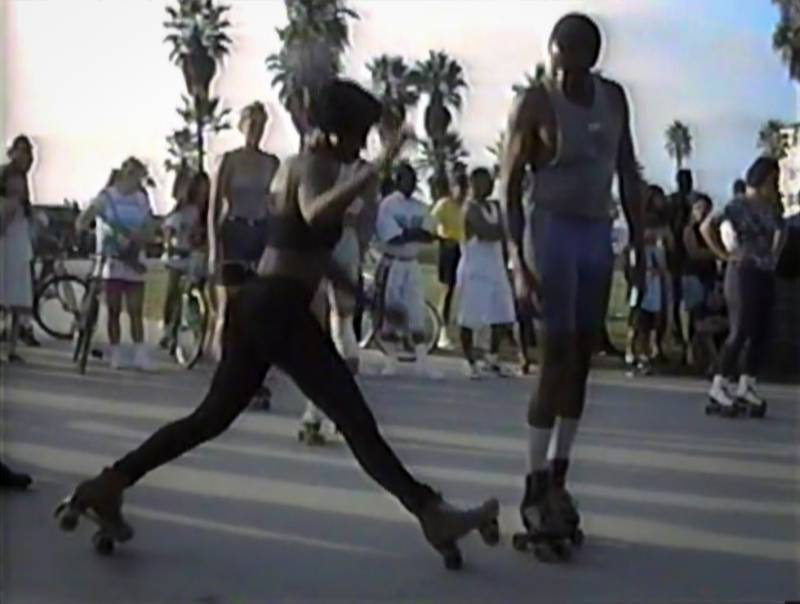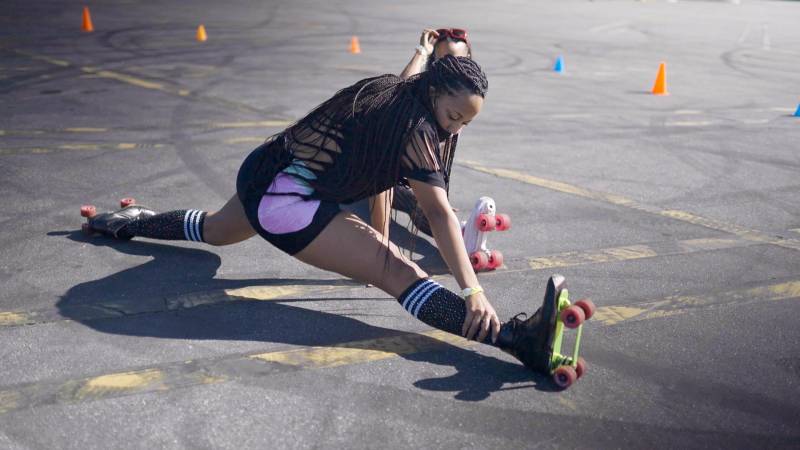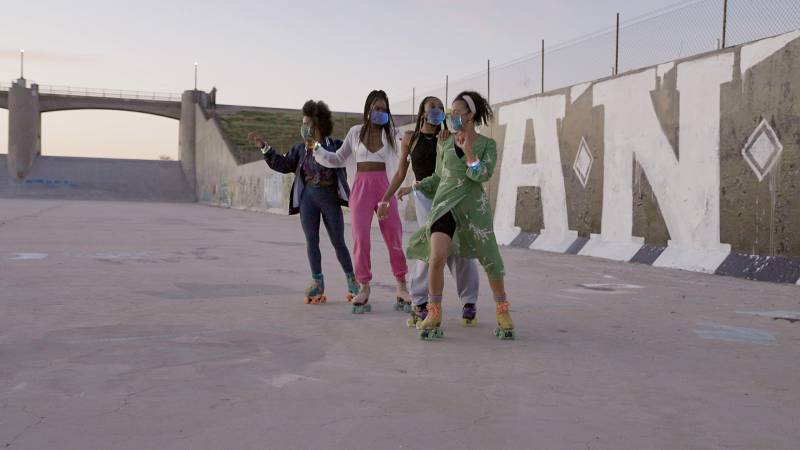Editor’s note: This episode was filmed under strict guidelines due to the coronavirus pandemic. Safety parameters were followed to protect the health of the dancers and video production team.
If Cities Could Dance is KQED Arts’ award-winning video series featuring dancers across the country who represent their city’s signature moves.
Download English transcript.
Kamry James had just gone through a bad breakup when she decided to try roller skating in 2019. It was love at first roll. “I would dream about roller skating,” she remembers. “I would wake up and go to work and be like, I just want to roller skate.” Not long after, she moved from Seattle to Los Angeles, where she started skating the city’s iconic beach boardwalks, surrounded by the OG skaters who made L.A.’s scene legendary.
In the past year, roller skating hit the mainstream as a safe and relatively accessible pandemic-era pastime, its international popularity bolstered by people recording their shaky progress on social media. Skates were sold out for months, and skaters have become major influencers on Instagram and TikTok. But longtime skaters like the community James found in L.A. are quick to remind everyone: This isn’t a fad.
“This is our culture. This is our lifestyle, passed down generations,” says Raquel “Roxy” Young, a third-generation rink skater. For Angelenos, roller skating is more than a roll down the block. Taking inspiration from break dancing and other skate scenes around the country, they developed their own style of dance.
Much of that style was honed in Venice Beach, where OG jam skaters with boom boxes in hand, claimed the boardwalk as their outdoor roller rink, showing off acrobatic freestyle moves, flips and choreographed routines. In 1978, Los Angeles Mayor Tom Bradley even declared Venice “the roller skating capital of the world.” Among the stars attracting huge crowds were the legendary Bad Boyz crew. But with the crowds came excessive policing. In the early 80s, Many of the OGs were arrested for playing loud music and pushed off the floor by police.

“They struggled to have their skate safe haven at Venice,” says Alicia Reason, a professional skater and mentee of OG Venice skaters.“There’s been so many trials and tribulations that our culture has dealt with and we always rise from it.”
While outdoor skating is a spectacle for anyone to watch and builds visibility for the dance form, local rinks are just as important to the L.A. skating scene. Indoors, the action is high-paced, with skaters zipping around the edge of the rink doing tricks, flips, slides and dips. “In a rink, every single night, it’s lit,” says Lily Ruiz, who’s been skating since she was a kid. “There are people who go there religiously. To be honest, they probably go to the rink more than they go to church.”
There’s a sense of community in rinks that can’t be replicated outdoors, she explains. It’s less of a meeting of friendly strangers, and more of a family reunion. You’ll find skaters of all ages, from as old as 80 to as young as fourteen months. “If you can walk, you can skate,” says Ahmber Azali as she teaches her one-year-old daughter.
Like the OGs at Venice Beach, Black rink skaters have long fought for their space to skate. In the early 50s, rinks often discriminated against or barred Black skaters. Today, skate rinks impose rules that affect mainly Black patrons, like outlawing micro fiberglass wheels (which make it easier to slide) or skates without toe stops—styles preferred by Black skaters.
Paradoxically, skating’s newfound popularity comes against a backdrop of rink closures as skate communities struggle to exist. In Los Angeles County, popular rinks like Skate Depot and Flippers are shells of their former glory. Maybe the most heartbreaking closure is World on Wheels, the iconic rink that rapper Nipsey Hussle helped reopen in 2017 after its first closing. In November 2020, it closed for good.
“It’s very devastating. And we’ve been trying to fight it,” says Young, who is also Nipsey Hussle’s cousin. For her, skating is therapy. To go without it is an unfathomable proposition. “It’s helped me go through a lot of dark nights and a lot of emotional experiences. I say it has saved my life,” she says.

When the pandemic shut down rinks, she tried skating in her living room, but she needed the full experience. “I called up some friends and I made a little outdoor skate party,” she says. In July 2020, she organized the first ROXY’s Backyard Sk8boogie, now a monthly event with as many as 1,500 skaters of all kinds attending. Young invited small Black businesses to be vendors. “We needed this,” she explains.
That community-minded impulse has spurred others to create spaces and groups for Black skaters. Ruiz—a leading critic of those who profit from a culture created by BIPOC skaters—created the Instagram account Casting Black Skaters. The objective is to bring visibility and opportunities to talented skaters who might otherwise be overlooked by brands capitalizing on the popularity of roller skating.
Similarly, James, herself a TikTok star, established SISTA Skate at the height of 2020’s racial reckoning, using the Instagram account to connect Black and brown women and non-binary skaters.

The pandemic wasn’t the first threat to L.A.’s skating scene, which means the community was determined to meet the challenge head-on. “Roller skating, that’s just something that Black people are never going to stop doing,” says Ruiz. “And it’s the one thing you just simply can’t take away from nobody.” — Article by Chinwe Oniah
L.A. is known as the skate capital of the world. With a recent resurgence in jam skating, check out the songs skaters are grooving to on the rink and on the streets.

